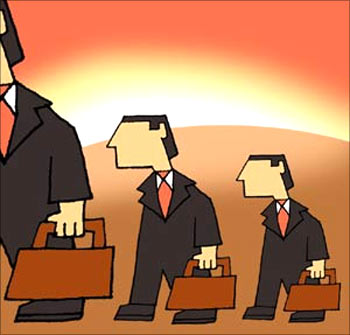 | « Back to article | Print this article |
Future Quotient: Just what is it all about?
Just when you thought that you had figured out the role of IQ and EQ in your own life and in management systems, here comes a new measure of capability. It's called the Future Quotient.
Future Quotient (FQ) is both an idea and a business concept designed to measure the ability to think and act not merely for the present but future generations.
A group of Western foundations and a think-tank have recently coined this term and done the first report on FQ which highlights '50 stars in seriously long-term innovation'.
As a measure of future-readiness FQ will be a way of assessing how well you could cope with, and overcome, both foreseeable and unforeseeable changes in the economy, society and environment.
The FQ report has been done by Volans and JWT. Volans is a United Kingdom-based think-tank and consultancy firm founded by John Elkington, the man who coined the term Triple Bottom Line. JWT is the world's oldest advertising agency.
The report has been co-sponsored by Atkins, The Dow Chemical Company, Shell Foundation and MindTime Technologies Inc.
Click NEXT to read on . . .
Future Quotient: Just what is it all about?
At the peak of the 2008 financial crisis Volans had published a report, titled 'The Phoenix Economy', which argued that this is not just another recession but the beginning of an era of creative destruction.
In such a period of turmoil, those who are either ill prepared or unwilling to reinvent themselves will perish.
The FQ survey is premised on the conviction that businesses, governments and civil society organisations must all rapidly re-configure themselves in order to meet the needs of both present and future generations.
One impetus for the FQ team came from an Accenture survey which showed that while that 81 per cent of CEOs say they have embedded sustainability in their company, only 29 publicly traded US companies have a 'chief sustainability officer'.
Many CEOs now confidently say that their company is on a journey towards social and environmental sustainability.
But, says the FQ report, "what they often mean is that the outlines of their enterprise are vague, the destination unclear, the captain and crew distracted, and the sailing date still to be agreed."
Click NEXT to read on . . .
Future Quotient: Just what is it all about?
So the FQ report has identified 50 high Future Quotient Stars who are thinking and acting differently.
Five hundred 'expert respondents' were surveyed to identify the characteristics needed to ensure new, future-friendly forms of leadership.
Seven key qualities surfaced out of this exercise. These include an ability to challenge the status quo from a position of both empathy and passion.
To be curious in a way that is open and playful. To foster collaborative relationships based on fusion and generosity. To have courage and optimism that enables you to flow with the currents of creative destruction and renewal.
Among the 50 stars that the report identifies as representing 'seriously long-term innovation' is the phenomenon of living bridges in the north-eastern states of India.
Described as the epitome of inter-generational innovation these bridges made of strong tree-roots are used to span turbulent mountain streams. Tree roots are teased and woven to create bridges up to 100 feet long, some of which last more than 500 years.
Click NEXT to read on . . .
Future Quotient: Just what is it all about?
Others in the list of stars include the natural science writer Janine Benyus, who coined the term 'biomimicry' and showed how we can emulate nature's designs to create sustainable solutions.
Scientists James E Hansen and James Lovelock are included because they first understood and warned about the dire implications of human induced climate change.
The Economics of Ecosystems and Biodiversity (TEEB) assessment, led by Pavan Sukhdev, is listed because it has developed an agenda for policy makers by providing precise data on the economic implications of declining ecosystems.
Paul Polman, CEO of Unilever, is one of the 50 stars because he guided the company to scrap quarterly reporting and shifted to a Sustainable Living Plan.
The FQ report lauds Polman for opposing short-termism and providing a guiding light to other CEOs as he seeks to help "drag the world back to sanity."
The Elders, an initiative launched by Nelson Mandela, is another star. This group of senior political leaders has been working for peace and tackling major global problems.
Click NEXT to read on . . .
Future Quotient: Just what is it all about?
So how can a company measure its FQ? This question is barely opened up and left to the second stage of this project.
As an interim step the FQ team has adopted an online platform which allows anyone to answer a questionnaire to test their way of thinking on three axes -- past, present and future.
Since it is co-sponsored by foundations and companies at the heart of the global business mainstream the FQ report will certainly go into wide circulation.
Generating acceptance for the concept of FQ may not be difficult. But whether a buzz about FQ will actually alter the way in which companies and markets respond is uncertain.
Some people may be inclined to dismiss this report since two of its co-sponsors are companies with a blemished record.
Dow Chemicals has been accused of shirking responsibility to Bhopal gas victims, after it bought over Union Carbide. Shell was a social and environmental pariah in the 1990s and has spent over a decade trying to alter that image.
But it is significant that these companies are now re-examining their relationship with environments and people impacted by their operations.
In a foreword to the FQ report the Director of the Shell Foundation, Chris West, has said: "the ability to navigate the future effectively depends on having an open mind, a willingness to learn from -- and admit to -- mistakes and a healthy appetite to go where others fear to tread."
There will be need for sceptics who will challenge such statements as empty politically correct talk. But there is an equal, or greater, role for those who are willing and able to see each of these actions as windows of opportunity.




